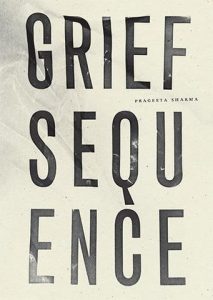Book Review
In Prageeta Sharma’s collection of poems, her husband’s sudden death makes vivid their emotional and personal differences. Her grieving is intense and messy. Without the other to complete her understanding of the space she occupies in the world, she is ghosted. “I feel you inside but not in space” she writes in “Between Sighs.” While it’s not unusual to feel the presence of someone lost, a familiar trope, Sharma’s intuitive and risk-taking poems never sentimentalize. In unpredictable ways she tames the space her husband continues to occupy, as in “My Poem About Last Sounds.” At the same time, she writes her grief into poems, elegy as bildungsroman:
The summer deck is filling with riotous rain pouring down from your hands, I think. I’m terrible at these supernatural images; you wouldn’t like it if I kept it up. I know you are trying to water the plants, and the seedlings and all of everything I might have neglected for the last three months while I’m here fucking it all up. You let me sit in my nightgown all day while I type on the computer under heaps of shitty books. You want me to move into something meaningful and I know you are a function of whatever it is because you gave me all the departing desires, as a way of teaching me to cope and to stay a poet when I don’t feel like being a poet.
Writing, she makes clear, is a hard if necessary means of coping. The poems don’t so much get her to a place of understanding as allow all past events their own value. This takes time and calls for countless revisiting of the past. It’s learning approached intuitively and at random—implicit rather than logical, goal-focused explicit learning. Her Notes make clear that poetic sequences implicitly constructed serve the poems, making room for raw memory and discourse.
Some things are particularly hard. In “Sequence 5,” New York friends arrive the day of deciding on hospice care for her husband. These friends “grasped the wrong part of my hostility. . . decided it was okay to be misogynists to the wife, she deserved it; she hadn’t kept up with her looks. . . . They pitied my hostility, girth, and sadness.” Questioning her own responses, she writes of other friends with terse economy in “Complicated Spiritual Grief, Part 1”:
All the spindly parts, tumor-shaped, even things painted for me by his admirers, some faulty, some careless. Spindly grievers. I couldn’t look at any of them as they kept metastasizing, but that was an action I knew was not mine to claim but through my affections for my beloved. How could I not love some of his friends or students? How is it that I settle on these feelings as he disappears?
Expressing feeling she can’t control, she adds, “I turn into my own madman . . . Did he enter my body? His energy? Can I be him lusting for himself?” She adds “How I wish to rise above these feuds.”
Yet continued self-assertion is a mark of progress, maybe, triumph. “Can you believe I’m still in all of what you thought, year two, I’d leave behind. That I would trounce above it like you are in somewhere you might call Byesville.” The breeziness of this statement seems to allow a last word, a valediction to surviving.
Although recalibration is the norm of grieving, you are almost surprised to realize, in “Sets of Things,” that the anxiety of coping with loss is being reformulated to consider potential loss of a new love:
I have too many anxious sequences now and they are blurring meaning. They are blurring my truths like time-lapses and I don’t rush to find the joy of occurrence without looking for the traps, and my logic, and my stumbling out into another bed that places me in the now-future . . . and I can’t rectify this sequence. And I worry that when I love him he will die, too.
She asks the dead husband, “Do you fall into bed with us? and I have no idea of this. I’d love to think it’s so, and we have room for your sets of things.” In “I Look at Your Handwriting,” time is not a continuum of events, but layered. The overlap of emotion, event, and understanding is summed up in a sentence of Steinian reiteration: “You were the first person and now you are one person and there is a second person.”
What is interesting is that the final pages yield to a less wrought form of expression. The grieving process has been one of unlearning. “I have to let go of all the literary shapes for truth,” she writes in “Hermetic,” as in real love with its “ice-hold” grip. What is important is that:
Grief, like poetry, can move from Orphic will to a hermetic opulence without anyone giving a shit about it. Poetry and grief are the same: you are taught to care about it when it happens to you.
It seems fitting that this almost-final poem demonstrates an ease with language as well as a sense of the “beginnings and endings” that a year sequencing grief has brought. The articulation of complex experience has raggedly taught that “words are simply the utterance of what half-thoughts can look like when we can’t help but speak to ourselves.” At last, able to rest in an image both tactile and resonant, she evocatively writes, “And now I have opened the blue silk curtains.”
About the Reviewer
Karen Kevorkian’s third poetry collection, Quivira, is recently published by 3:A Taos Press. She is a lecturer at UCLA.
